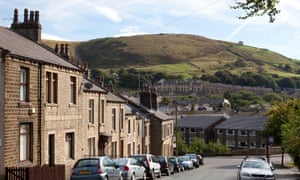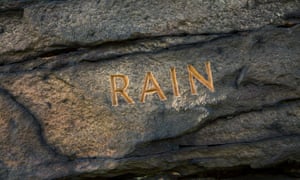Marsden is the last village in the Colne Valley as it climbs westward from the former textile town of Huddersfield into the West Yorkshire Pennines. My parents lived in a terrace house on the south-facing side (an end terrace, in fact, which we could claim as “semi-detached” in more aspirant moments), up a steep, narrow road that was rumoured to be Roman in origin and still carries the contours of stone steps in the middle of the carriageway, beneath several layers of asphalt. My bedroom, made from a partitioned section of my parents’ bedroom, looked straight down into the bowl of the village, the house occupying an enviable grandstand location for such a modest property.
The only other terrace or “block” with the same aspect consisted of 20 houses and was known colloquially as Titanic Row, either because of its impressive length, or because it was built in 1912, or because it was sinking slowly into the clay foundations. I watched a lot of TV as a kid and didn’t read much other than comics, so I associate my first poetic experiences with the view from that bedroom window, especially the view at night, dreaming with my eyes wide open when I should have been asleep. I’d watch the streetlamps blink into action, the shutters and blinds go down in the shops at the top of Fall Lane, and headlamps illuminate distant lanes and gable ends. I’d watch people whose shapes and outlines I recognised going into the New Inn or coming out of the Old New Inn, and curtains being drawn in the houses of neighbours and family friends.
I’d see strangers, on foot or in unfamiliar vehicles, and I’d imagine incidents taking place behind closed doors, though none of this was ever written down at the time. It became a kind of compulsion, or at least a routine, thinking about the invisible goings-on, all the standoffs and stalemates, the affairs and fisticuffs, the shenanigans and shady deals. Thinking also about the mundane and the commonplace, of people performing in the scenes and sketches of their regular lives, reinforcing my understanding of how the world worked and indulging a fascination with everyday domestic detail.
Coming back to the village after three years at Portsmouth Polytechnic, with no job and in no hurry to get one, I started looking out of that window again, and out of the large picture window in the living room with its wide-angle view of Marsden – and I was ready to write. By that time I was a geography graduate with a head full of theories about people and places. So the village became the drawing board or board game on which I could practise my poetics and play out my perspectives. The frame of the window might have operated as a limiting device, restricting my perception of the wider world, but it was an invaluable template for bringing focus to the poems and legitimising the use of local subjects and vernacular in a poetic context.
So the post office got the treatment, as did the fire station, and the petrol station, and the snow-warning light on the main road. Even the house itself became a kind of “cathedral of the ordinary” in that era of few material goods where possessions were somehow part of a ritualistic fabric of life and household events had a near-sacramental pattern and process. My dad’s cars, incomprehensibly expensive at the time, acquired the status of close relatives or large exotic pets, not just means of transportation but characters with names, personalities, idiosyncrasies and smells. Even though I’m pretty sure I never took a bite out of it I can still “taste” the cracked red leather seats in the back of the Hillman Minx and picture the lettering on the registration plate: BAP 69P.
If all that goes some way towards explaining why I wrote so much about Marsden in my first collection, Zoom! (1989), and my second collection Kid(1992), while I was still living there, it doesn’t really explain why I’ve continued to address it – on and off – for another three decades. True, I only live a couple of valleys away, but in these parts that’s the equivalent of self-imposed exile. Yet distance seems to necessitate the occasional recalibration or rebalancing of the scales, as if I’m using the village as a standard of poetic measurement, or as a measurement of poetic standard. In 2015 I publishedThe Unaccompanied, a collection that had accumulated slowly since around 2008, the year of the financial crash. Until I started to work out an order for the manuscript, I hadn’t realised how much I’d been writing about Marsden again, this time charting the effects of the recession, and the austerity that followed, and a growing sense of marginalisation in what was supposed to be an age of increased communication and connectedness.
The village has changed. Many of the amenities and services I described in those early poems no longer exist. Two of the big mills are still standing, but are empty and decaying. New housing estates have replaced brownfield sites or encroached on to the moor. The moors themselves are greener and trees have sprung up even beyond the recognised “tree line” – a consequence of climate change and reductions in chimney smoke and soot. And the giant eyesore of a gasometer, rising and falling like some grotesque iron lung, is no more. On the other hand, the basic layout is still the same, as is the population size, as is a sizeable proportion of the population. The clock on the Mechanics’ Institute still pokes up above the rooftops on Peel Street, even if it rarely tells the right time. And Samuel Laycock, “the Marsden poet” (what the hell do I have to do?), still looks out from his plinth near the bandstand in the park. So there’s a surface continuity, at least, to draw on and return to, as well as a continuity of vocabulary and dialect. These days a “regional accent” is usually thought of as a marker of authenticity and identity, but growing up we were told to speak “properly” and sometimes threatened with elocution lessons, because with the unsophisticated noises that came out of our mouths we would never get anywhere.
Beyond the linguistics, I’ve come to feel that there is something genuinely unique about this transcendent and transgressive location: a border area where habitation meets the uninhabitable; where Yorkshire meets Lancashire (not just topographically, but culturally); where the land disappears into the sky on many days of the year; where the last lawn is separated from the moor by the dividing line of a privet hedge; where roads peter out into cart-tracks and bridleways. The residents who have resurrected pagan fire festivals in Marsden and celebrate the zeal and resistance of the local Luddites chapter are the same people waiting at the station in the morning, commuting to IT jobs in Manchester and Leeds.
The village was an extraordinary adventure playground for a child, with its system of switchbacks, towpaths and unadopted roads, and with its many reservoirs, like a sleeping pantheon of water deities above our heads, whose names became a recited litany of localness and belonging among those in the know. More recently they have lent their titles to beers in the village brewpub, though I’ve never found a pint of Butterley or Cupwith an especially refreshing thought, remembering some of the things we found in those bodies of water, and some of the things we did in them.
In attempting to describe border regions as good places to write – for the friction and exchange that takes place along the collision front – I once said in an interview that I grew up with one foot on the pavement and the other in the pigsty, something of an exaggerated claim (in fact, on Old Mount Road there were neither). But on Pule Hill, the landmark above Marsden with its distinctive silhouette, prehistoric burial sites and caves exist side by side with quarries and ventilation shafts from the railway tunnel beneath, more honest indicators of the kind of duality or interface I was trying to articulate.
My poem “Snow” is carved into the rocky escarpment on the exposed flank of Pule Hill, the first of six Stanza Stones that form a 50-mile trail from Marsden to the far side of Ilkley Moor. Thus far it’s the only one to be vandalised. Just bored kids throwing rocks, probably, but a useful caution against being a priest in your own parish.
A few years ago my parents reluctantly flitted from the house they had lived in for over half a century to a house in the village centre, a property near a bus stop, shops, the church, pubs, the doctors’ surgery, and somewhere that doesn’t require a gritting lorry and grappling irons to make it accessible when one of those old-fashioned winters rolls in. The reluctance was mine, too; having identified the house I grew up in as a kind of creative wellspring, it crossed my mind that without it I might dry up. If anything, though, not having a foothold in that property, and having emptied it of family possessions, I’ve felt able to investigate it more freely and without the obligations that superstition and nostalgia can sometimes impose. Free to be more honest, and free to mythologise.
• Magnetic Field: The Marsden Poems is published by Faber (RRP £14.99) on 19 March. To order a copy go to guardianbookshop.com. Free UK p&p over £15.



No hay comentarios:
Publicar un comentario